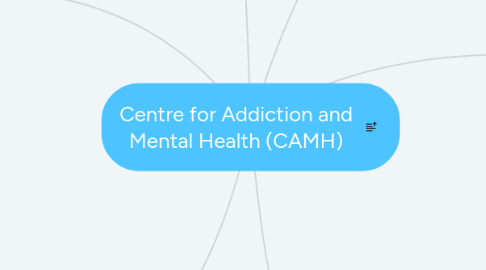
1. Vision: To Inspire Change
1.1. "Sets the standard for care, research, education, and leading social change"
2. Aboriginal Services
2.1. Part of their outpatient services, located off the main hospital at the Queen St. site
2.2. For Aboriginal people experiencing substance abuse and mental health issues
2.2.1. Available through self-referral
2.2.2. Provides individual counselling and group therapy sessions
2.2.3. Holistic approach
2.2.3.1. Combine therapeutic and psycho-educational groups
2.2.3.2. Cultural programming
2.2.3.3. Ceremonies
2.2.3.4. Onsite sweat lodge
2.3. The team
2.3.1. Aboriginal Social Workers
2.3.2. Aboriginal Occupational Therapist
2.3.3. Elder / Traditional Healer
2.3.4. Psychiatrist
3. CAMH Foundation
3.1. "CAMH Foundation drives change for mental health by inspiring philanthropy that enables leading-edge care, research and education at CAMH"
4. About CAMH
4.1. Canada's largest mental health teaching hospital; fully affiliated with University of Toronto
4.2. Conducts Research
4.3. Training for health care professionals and scientists
4.4. Develop health promotion and prevention strategies
4.5. Advocates on public policy issues at all levels of government
5. Student Centre
5.1. A space created in 2014 to enhance learning from students across all disciplines
6. Services for Youth
6.1. Substance Abuse Program for African Canadian and Caribbean Youth (SAPACCY)
6.1.1. "SAPACCY provides support and counselling to African and Caribbean Canadian youth who are dealing with problem substance use and mental health concerns."
6.2. Youth Addiction & Concurrent Disorders Service
6.2.1. For young people (14-24 years) who have substance use challenges/concerns, with or without concurrent mental health concerns.
6.2.2. Partner with Toronto District School Board (TDSB): R.E.A.C.H. to earn secondary school credits while receiving treatment
6.2.3. Partner with Youth Day Hospital, working with youth who need more intensive support to prevent hospitalization, while supporting academic functioning
6.3. Mood & Anxiety Service for Children & Youth
6.3.1. "Children and young people seen in the service are typically experiencing problems related to worry, phobias, emotions, sadness and/or hopelessness."
6.3.2. Provide psychiatric assessments and psychosocial treatments
6.4. LEARN
6.4.1. LEARN offers a range of social, educational and recreation programming for young people experiencing early signs of psychosis.
6.4.1.1. Provides youth opportunity to write the General Education Development (GED) exam with both classroom and exam accommodations

